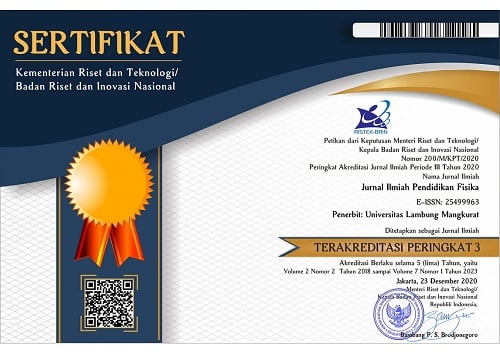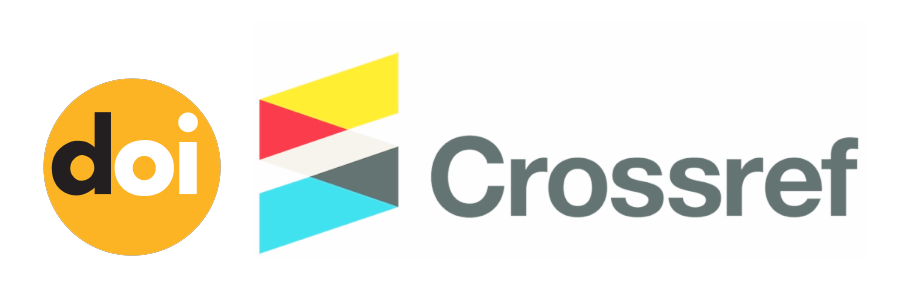Fostering Critical Thinking through PBL-SSI in Renewable Energy Topic among High School Students
Abstract
Fostering critical thinking stands out as a paramount objective in learning, warranting diligent cultivation and refinement. This study uses a Problem Based Learning (PBL)- Socio-Scientific Issues (SSI) learning model for renewable energy materials to enhance students' critical thinking skills. This research utilized a quantitative method with a one-group pretest-posttest design, and the sample comprised 33 students from SMAN 3 Samarinda. Data collection involves assessments with ten questions in the form of essays. Conclusions from the research show that using PBL with SSI learning models on renewable energy can foster students' capacity for critical thinking. After the learning process, 21 out of 33 students were classified as critical, and 12 out of 33 students were classified as very critical, with an average N-Gain value of 0.69, which is included in the medium category, and a paired (2-tailed) T-Test Sig value of 0.000, which indicates there is a significant influence from the use of PBL-SSI. This research provides insights into how teachers might use this approach in the classroom to help students become more adept critical thinkers in the twenty-first century by giving them resources to broaden their critical thinking skills.
Keywords
Full Text:
PDFReferences
Agustin, P. N., Lesmono, A. D., & Bachtiar, R. W. (2017). Pembelajaran fisika di sma dengan menggunakan model kooperatif tipe stad (Kajian: Di sman 1 tapen bondowoso). Jurnal Pembelajaran Fisika, 6(2), 201–207.
Anggraeni, A., Kholifah, K., & Suliyanah, S. (2024). Implementation of problem-based learning to improve cognitive understanding and quality of learning of global warming’s topic. Berkala Ilmiah Pendidikan Fisika, 12(1), 74. https://doi.org/10.20527/bipf.v12i1.17462
Aprilia, F., Surahman, E., & Sujarwanto, E. (2023). The effect of the practicum-based learning cycle 5e learning model on critical thinking skills on mechanical wave material. Berkala Ilmiah Pendidikan Fisika, 11(2), 255. https://doi.org/10.20527/bipf.v11i2.16193
Azizah, M., Sulianto, J., & Cintang, N. (2018). Analisis keterampilan berpikir kritis siswa sekolah dasar pada pembelajaran matematika kurikulum 2013. Jurnal Penelitian Pendidikan, 35(1). https://doi.org/https://doi.org/10.15294/jpp.v35i1.13529
Badan Standar Kurikkulum dan Asesmen. (2022). Capaian pembelajaran mata pelajaran fisika fase e–fase f untuk sma/ma/program paket c. Kemendikbudristek. https://kurikulum.kemdikbud.go.id/kurikulum-merdeka/capaian-
pembelajaran#filter-cp
Basri, H., Purwanto, As’ari, A. R., & Sisworo. (2019). Investigating critical thinking skill of junior high school in solving mathematical problem. International Journal of Instruction, 12(3), 745–758. https://doi.org/10.29333/iji.2019.12345a
Darling-Hammond, L., Flook, L., Cook-Harvey, C., Barron, B., & Osher, D. (2020). Implications for educational practice of the science of learning and development. Applied Developmental Science, 24(2), 97–140. https://doi.org/10.1080/10888691.2018.1537791
Darwoto. (2023). Upaya meningkatkan aktivitas dan hasil belajar fisika melalui model pembelajaran think pair share (tps) pada siswa kelas xi mia 3 sma negeri 1 situbondo. Consilium Journal : Jpurnal Education and Counseling, 3(1), 55–80.
DeGhett, V. J. (2014). Effective use of Pearson’s product-moment correlation coefficient: An additional point. Animal Behaviour, 98, e1–e2. https://doi.org/10.1016/j.anbehav.2014.10.006
Ericson, J. D. (2022). Mapping the relationship between critical thinking and design thinking. Journal of the Knowledge Economy, 13(1), 406–429. https://doi.org/10.1007/s13132-021-00733-w
Fadilla, N., Nurlaela, L., Rijanto, T., Ariyanto, S. R., Rahmah, L., & Huda, S. (2021). Effect of problem-based learning on critical thinking skills. Journal of Physics: Conference Series, 1810(1), 8–13. https://doi.org/10.1088/1742-6596/1810/1/012060
Fitriani, A., Zubaidah, S., Susilo, H., & Al Muhdhar, M. H. I. (2020). PBLPOE: A learning model to enhance students’ critical thinking skills and scientific attitudes. International Journal of Instruction, 13(2), 89–106. https://doi.org/10.29333/iji.2020.1327a
Fraenkel, J. R., Wallen, N. E., & Hyun, H. H. (2012). How to design and evaluate research in education (8th ed.). McGraw Hill.
Griffin, P., & Care, E. (2015). Assessment and teaching of 21st century skills: Method and approach. In Educational Assessment in an Information Age.
Gunawardena, M., & Wilson, K. (2021). Scaffolding students’ critical thinking: A process not an end game. Thinking Skills and Creativity, 41(July 2020), 100848. https://doi.org/10.1016/j.tsc.2021.100848
Gustomo, A. E. (2020). Workshop inovasi pembelajaran di sekolah dasar problem based learning to improve critical thinking. SHEs : Conference Series, 3(4), 98–103. https://jurnal.uns.ac.id/shes
Hall, D. M. H., Miller, S. E., & Tice, C. J. (2021). Understanding and assessing critical thinking: A national survey of social work educators’ perceptions. Journal of Social Work Education, 57(2), 226–238. https://doi.org/10.1080/10437797.2019.1670308
Indah, A. D., & Fauzan, A. (2019). Analisis kemampuan berpikir kritis matematis peserta didik kelas viii smp negeri 3 payakumbuh menggunakan watson-glaser critical thinking appraisal. Jurnal Edukasi Dan Penelitian Matematika, 8(3), 124–129.
Joshi, A., Desai, P., & Tewari, P. (2020). Learning analytics framework for measuring students’ performance and teachers’ involvement through problem based learning in engineering education. Procedia Computer Science, 172, 954–959. https://doi.org/10.1016/j.procs.2020.05.138
Kardoyo, Nurkhin, A., Muhsin, & Pramusinto, H. (2020). Problem-based learning strategy: Its impact on students’ critical and creative thinking skills. European Journal of Educational Research, 9(3), 1141–1150. https://doi.org/10.12973/EU-JER.9.3.1141
Linh, N. Q., Duc, N. M., & Yuenyong, C. (2019). Developing critical thinking of students through STEM educational orientation program in Vietnam. Journal of Physics: Conference Series, 1340(1). https://doi.org/10.1088/1742-6596/1340/1/012025
Mabrurah, F. F., Qadar, R., & Sulaeman, N. F. (2023). Enhancing high school students’ critical thinking skills through stem-pjbl in optics topic. Berkala Ilmiah Pendidikan Fisika, 11(1), 1.
https://doi.org/10.20527/bipf.v11i1.14068
Mahmud, M. M., & Wong, S. F. (2022). Digital age: The importance of 21st century skills among the undergraduates. Frontiers in Education, 7(November), 1–9. https://doi.org/10.3389/feduc.2022.950553
Nuraida, D. (2019). Peran guru dalam mengembangkan keterampilan berpikir kritis siswa dalam proses pembelajaran. Jurnal Teladan: Jurnal Ilmu Pendidikan Dan Pembelajaran, 4(1), 51–60.
Razak, F. (2017). Hubungan kemampuan awal terhadap kemampuan berpikir kritis matematika pada siswa kelas vii smp pesantren immim putri minasatene. Mosharafa : Jurnal Pendidikan Matematika, 6(1), 123.
Rizkita, N. I., & Mufit, F. (2022). Analisis pemahaman konsep dan sikap siswa terhadap belajar fisika pada materi hukum newton tentang gerak. Jurnal Eksakta Pendidikan (Jep), 6(2), 233–242. https://doi.org/10.24036/jep/vol6-iss2/599
Samson, P. L. (2016). Critical thinking in social work education: A research synthesis. Journal of Social Work Education, 52(2), 147–156. https://doi.org/10.1080/10437797.2016.1151270
Suarniati, N. W., Hidayah, N., & Dany Handarini, M. (2018). The development of learning tools to improve students’ critical thinking skills in vocational high school. IOP Conference Series: Earth and Environmental Science, 175(1). https://doi.org/10.1088/1755-1315/175/1/012095
Suwastini, N. K. A., Puspawati, N. W. N., Adnyani, N. L. P. S., Dantes, G. R., & Rusnalasari, Z. D. (2021). Problem-based learning and 21st-century skills: Are they compatible? EduLite: Journal of English Education, Literature and Culture, 6(2), 326.
https://doi.org/10.30659/e.6.2.326-340
Toheri, Winarso, W., & Haqq, A. A. (2020). Where exactly for enhance critical and creative thinking: the use of problem posing or contextual learning. European Journal of Educational Research, 9(2), 877–887. https://doi.org/https://doi.org/10.12973/eu-jer.9.2.877
Tortorella, G., & Cauchick-Miguel, P. A. (2018). Teaching lean manufacturing at a postgraduate level: Integrating traditional teaching methods and problem-based learning approach. International Journal of Lean Six Sigma, 9(3), 301–323. https://doi.org/10.1108/IJLSS-08-2017-0101
Uliyandari, M., Emilia Candrawati, Anna Ayu Herawati, & Nurlia Latipah. (2021). Problem-based learning to improve concept understanding and critical thinking ability of science education undergraduate students. IJORER : International Journal of Recent Educational Research, 2(1), 66–67. https://doi.org/10.46245/ijorer.v2i1.56
Utami, B., Saputro, S., Ashadi, A., Masykuri, M., Probosari, R. M., & Sutanto, A. (2018). Students’ critical thinking skills profile: constructing best strategy in teaching chemistry. IJPTE : International Journal of Pedagogy and Teacher Education, 2(January), 63. https://doi.org/10.20961/ijpte.v2i0.19768
Wilsa, A. W., Susilowati, S. M. E., & Rahayu, E. S. (2017). Problem based learning berbasis socio-scientific issue untuk mengembangkan kemampuan berpikir kritis dan komunikasi siswa. Journal of Innovative Science Education, 6(1), 129–137. http://journal.unnes.ac.id/sju/index.php/jise
Zubaidah, S. (2016). Keterampilan abad ke-21: Keterampilan yang diajarkan melalui pembelajaran. Seminar Nasional Pendidikan Dengan Tema “Isu-Isu Strategis Pembelajaran MIPA Abad 21, Desember, 1–17.
DOI: https://doi.org/10.20527/jipf.v8i2.12427
Refbacks
- There are currently no refbacks.
Indexed by: Jurnal Ilmiah Pendidikan Fisika is licensed under a creative commons attribution-share alike 4.0 international license
Statistics Counter |
















